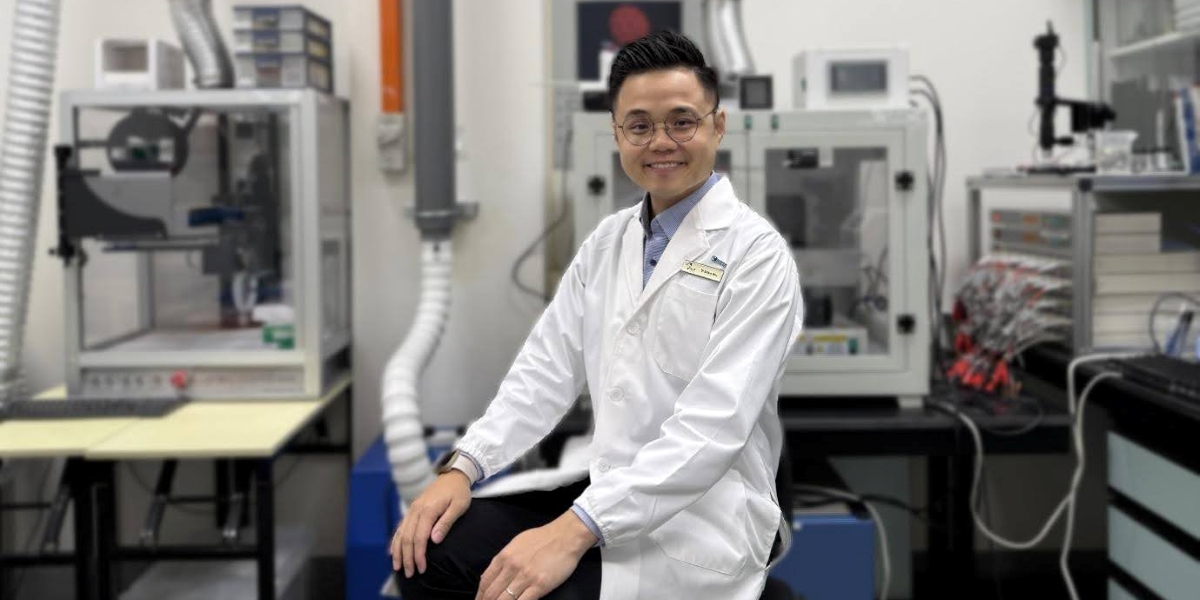By: Elowen Gray
In a remarkable breakthrough poised to potentially transform energy storage, Dr. Edison Huixiang Ang, a materials scientist at the National Institute of Education, Nanyang Technological University (NIE-NTU), is leading a collaboration with scientists from Huaiyin Normal University. Harnessing the power of artificial intelligence (AI), the team is addressing one of the toughest challenges in rechargeable battery technology. This AI-driven innovation could help set the stage for a new generation of batteries—ones that might be smarter, safer, more efficient, and longer-lasting—with the potential to redefine the future of global energy systems.
Intelligent Material Innovation Powered by AI
Zinc-ion batteries are gaining attention as a potential, affordable, and sustainable alternative to lithium-ion batteries. However, like their lithium counterparts, zinc-ion batteries face a major hurdle: dendrites—tiny, needle-like structures that grow during charging, leading to short circuits and drastically shortening battery life.
In the past, solving this problem meant relying on slow and expensive trial-and-error experiments. But Dr. Edison Ang and his team chose a smarter approach. By applying machine learning and AI algorithms, they rapidly screened over 168,000 possible material combinations—a process that would have taken years using traditional methods. This AI-driven approach led to the discovery of a cerium-iron metal-organic framework (MOF), which helps prevent dendrite formation and may extend battery lifespan.
This potentially game-changing discovery brings zinc-ion batteries closer to becoming a practical, cost-effective, and environmentally friendly solution for the future of energy storage.
AI-Driven Innovation: Revolutionizing Battery Safety and Longevity
Dr. Edison Ang’s innovation extends beyond material discovery. His team also developed an advanced protective MOF interface layer that enhances the safety, stability, and longevity of zinc-ion batteries. This layer works to prevent dendrite formation while improving overall performance. The new battery design has demonstrated strong results, operating for over 4,300 hours with an impressive 99.8% efficiency after 1,400 cycles. This performance outperforms that of traditional batteries, which typically experience significant efficiency loss after many charge cycles.
“AI is revolutionizing how we approach energy material innovation,” said Dr. Ang. “By leveraging AI algorithms to predict and design optimal materials, we are developing batteries that are not only safer and more efficient but also environmentally sustainable.” This breakthrough represents a shift in how battery technologies are developed, making the process faster, more reliable, and potentially more cost-effective.
AI Unlocking the Future of Energy
The implications of this breakthrough could be far-reaching, with potential applications across multiple industries. From consumer electronics to electric vehicles and large-scale energy storage, the demand for more efficient, durable, and sustainable batteries is growing rapidly. By applying AI to accelerate the discovery and design of materials, Dr. Edison Ang’s team is tackling a key challenge in energy storage while helping to pave the way for a more reliable, affordable, and sustainable energy future.
This AI-powered approach to battery design might help accelerate the development of next-generation energy storage solutions. As renewable energy becomes more widespread, the need for reliable energy storage systems is more important than ever. Dr. Edison Ang’s research could help contribute to the creation of batteries that last longer, charge faster, and have a lower environmental impact, making clean energy solutions more accessible and scalable worldwide.
AI in Materials Science: A New Era of Innovation
What makes Dr. Edison Ang’s research particularly groundbreaking is the seamless integration of AI with traditional materials science. Rather than relying on time-consuming and expensive experimental methods, Dr. Ang and his team use AI to simulate and predict how different materials will perform. This allows them to quickly identify the best solutions and reduce the time it takes to develop new materials.
AI also enables researchers to explore materials that may have been overlooked or considered too complex for traditional analysis. By predicting how materials will behave under different conditions, AI helps researchers design more efficient and reliable materials for specific applications. Dr. Edison Ang’s work exemplifies how AI can drive innovation in materials science, potentially solving real-world problems more efficiently.
A Vision for the Future: AI as a Tool for Sustainable Development
For Dr. Edison Ang, the use of AI in energy material research is not just about technology—it’s about achieving a more sustainable future. “AI is not just a tool; it’s the key to unlocking a future of endless possibilities, where innovation meets boundless potential,” said Dr. Edison Ang. “AI empowers every researcher, no matter where they are, to dream beyond limits, innovate rapidly, and create solutions that can reshape the world.” By using AI to develop better and more sustainable battery technologies, Dr. Edison Ang’s work is contributing to the creation of energy solutions that are cleaner, smarter, and more accessible for everyone, helping to pave the way for a brighter future.
The study has been published in Energy & Environmental Science. For further details, the full study is available here: https://doi.org/10.1039/D5EE00650C
Published by Jeremy S.
















